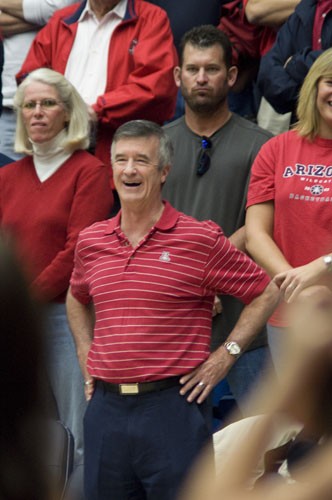In the four years since he took the reins as UA president, Robert Shelton has had to navigate many stormy seas. There have been budget deficits, department mergers, staff and faculty layoffs, tuition hikes, negotiations with a difficult state and the curious case of Lute Olson’s on and off retirement. Shelton recently shared his thoughts on dealing with high-powered decision-making and the pressures of his job.
You said you’re not sure why anyone would want to be a university administrator in this day. Why?
These jobs right now have a lot more constraints than they have opportunities. The only reason to do these jobs is if you think you can make a difference. If you think you can move an institution — or a department, or a program, or a college — forward in ways that aid discovery of new knowledge … and you have to feel like you have enough tools, enough resources — not just fiscal, but overall — to make a difference. And right now, it’s hard for people to find that.
In your November State of the University address, you mentioned the constant criticism. Is that difficult to put up with?
If you aren’t getting criticism, you aren’t making any decisions at all. So, that’s not the worrisome part. The worrisome part for us right now is whether the state has the courage of leadership to pull us out of the financial mess that we’re in now. And I’m worried about that. I’m not worried about day-to-day budgets. We can deal with that. But we need people who are going to make hard decisions at the state level, and what I want to see in those hard decisions is that they value education, K-12 and higher ed.
Do you get angry or frustrated by these problems?
I think what really disturbs me is when people distort facts or hide the facts or play fast and loose with factual information. You can make multiple interpretations of the same information, but you should at least be honest and put factual information out there for everybody to see. When somebody is trying to conceal something or they’re misrepresenting the data — there’s my science background coming in — it just drives me crazy.
Is your job isolating?
I don’t feel isolated from people. I think there’s a lot of contact in here. I see students all the time. I’ll go down and have lunch with them sometimes in the Union, write letters of reference for students that I’ve known and work(ed) with. I think it’s a point to guard against, being isolated, just spending time in this room. That’s not good. The days get pretty filled up, but I try to get out a couple times a week, talking to people, going to different events that are scheduled.
What’s a typical day?
I probably get here by 7:30 (a.m.) and probably leave by 6:30 (p.m.). But I’ll bet on the average four nights a week, maybe five, there’s some event. A dinner at our house for major supporters or donors, there are talks to (be) given, legislators to meet.
How do you combat the toll that these demands claim on you and your family?
I’m fortunate in this case that the children are all away from home. I can’t imagine doing this job with small kids at home. My wife is very self-sufficient. She has her own career, which she has had to reinvent a number of times. She now has a consulting business, so in that sense, our lives are simplified. But what you do need, at least I need, is periodically just to recharge your batteries. And we do that sometimes at home … just have a glass of wine and sit out and look at the lights of Tucson. I enjoy going to sporting events, believe it or not, that’s relaxation. This last summer, we took nine days (off) and went up to the Canadian Rockies and did a little hiking. Doing something physical is very important.
How about relaxing with Facebook?
No. It seems to me that it’s sort of intrusive into the student regime, but no, I don’t have a Facebook.









